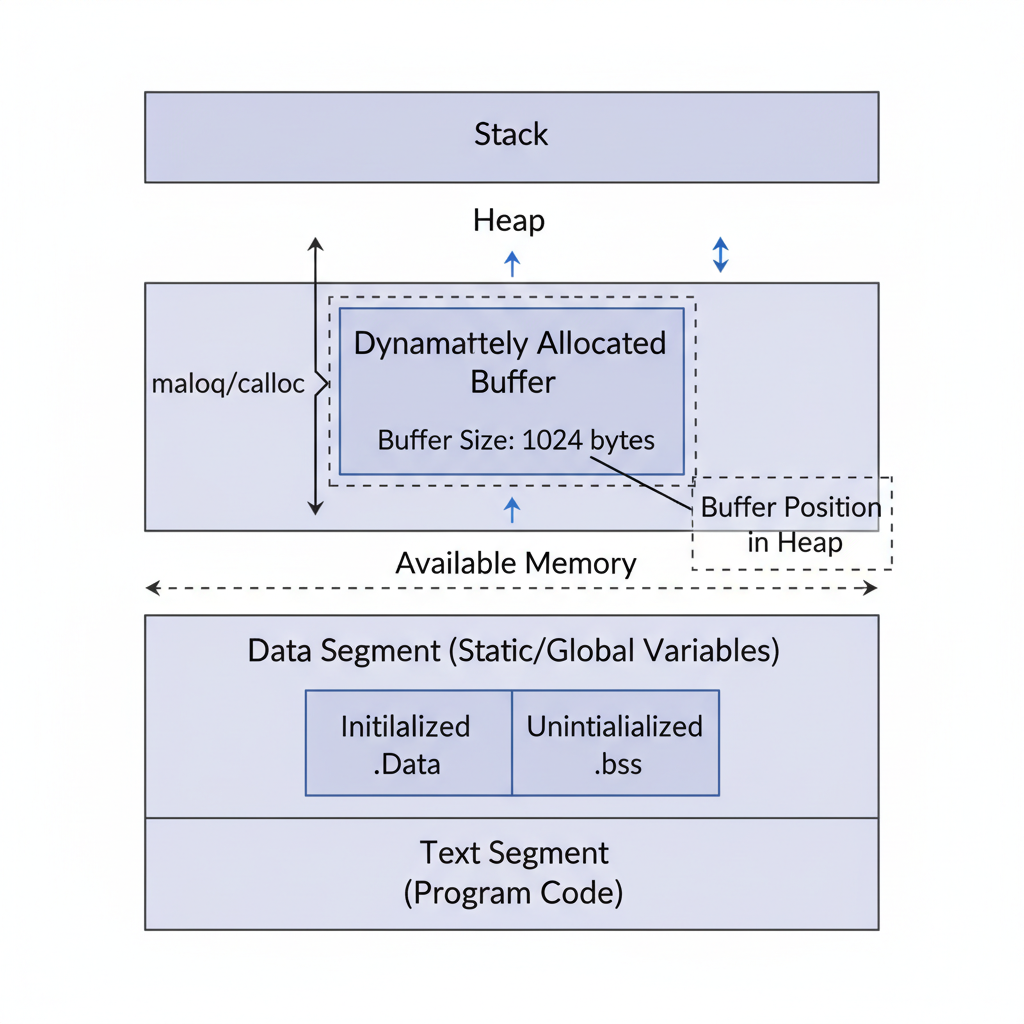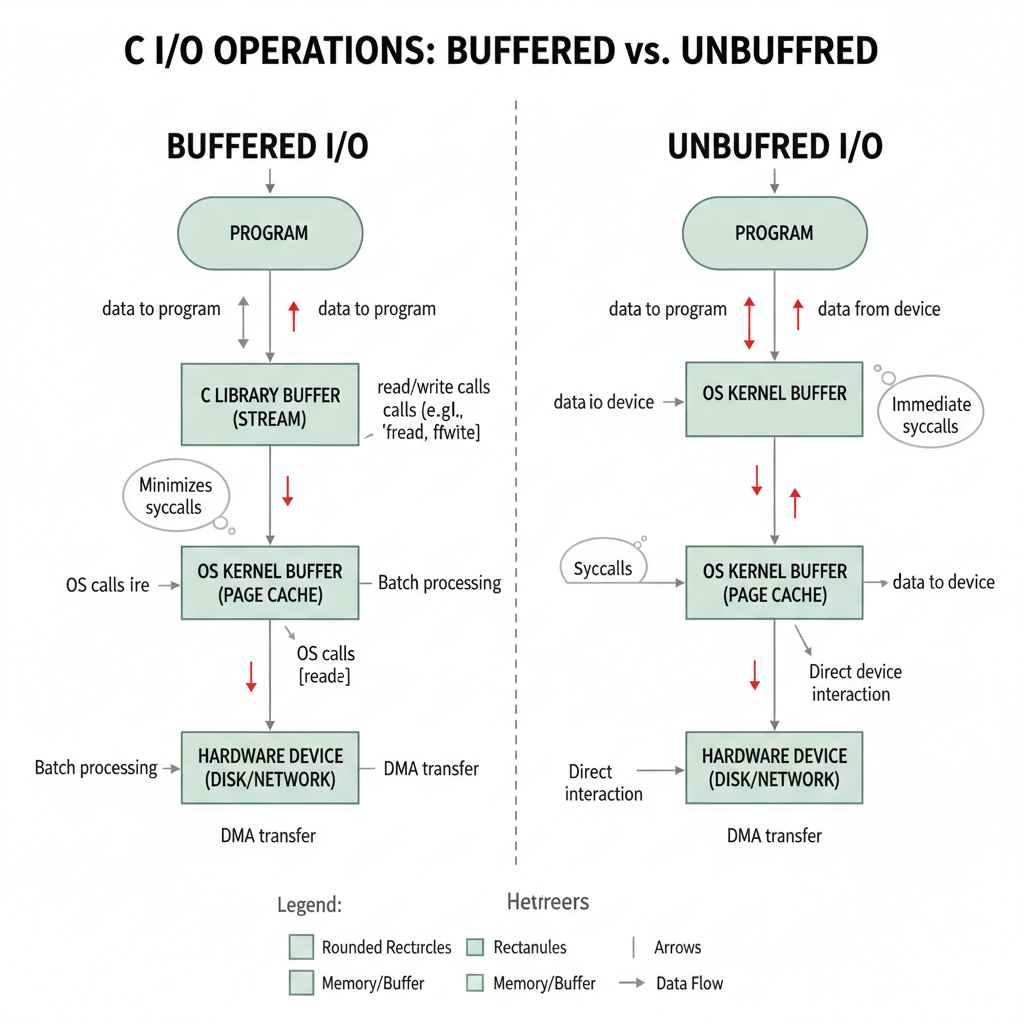What Is Buffer in C: Definition, Types, and Code Examples
Learn what buffers in C are, explore static and dynamic allocation, buffered vs unbuffered I/O, and see examples for efficient data handling.

Introduction to Buffers in Programming
In C programming and other languages, buffers are a fundamental concept used to temporarily hold data in memory while it’s being transferred between components. Understanding what a buffer in C is can significantly improve the efficiency of file handling, networking, and other I/O operations. Buffers help optimize performance by reducing the number of expensive system calls and smoothing out differences in data transfer speeds.

---
What Is Buffer in C?
In the C programming language, a buffer refers to a contiguous block of memory reserved to store data temporarily. Both the C runtime library and operating systems rely on buffers in file I/O, networking, and inter-process communication.
A buffer is essentially a staging area:
- Data can be read into the buffer from a source (such as a disk or network).
- Data can be written from the buffer to a destination.
By processing data in chunks rather than byte-by-byte, buffers improve throughput and reduce computational overhead.
---
Memory Allocation for Buffers in C
In C, a buffer is often implemented as an array of `char`, `int`, or other types. It may be statically allocated (fixed size) or dynamically allocated (adjustable size at runtime).
Static Allocation Example:
char buffer[256]; // Fixed size buffer allocated on the stackDynamic Allocation Example:
char *buffer = malloc(256 * sizeof(char)); // Heap allocation
if (buffer == NULL) {
perror("Failed to allocate buffer");
}Static allocation is straightforward but inflexible. Dynamic allocation provides flexibility to accommodate varying data sizes during program execution.

---
Buffers in Input/Output Operations
Buffers are critical in I/O operations:
- Input buffer: Holds incoming data before it is processed.
- Output buffer: Holds outgoing data before sending to a destination.
For instance, when reading a file using `fgets()`, the function fills the buffer with a chunk of file data before returning the requested portion.
Why Buffers Matter in I/O
- Reduce expensive system calls.
- Smooth out speed mismatches between input source and program processing.
- Enhance performance in networking and file handling scenarios.
---
Types of Buffers in C
Different buffer types are used depending on application needs:
| Buffer Type | Description | Typical Use Case |
|---|---|---|
| Single Buffer | One contiguous block of memory used for data storage | Basic file I/O, simple data exchange |
| Double Buffer | Two buffers used alternately to read/write data | Smooth graphics rendering, streaming media |
| Circular Buffer | Buffer in which the end wraps around to the start | Real-time data processing, audio/video streaming |
---
Buffered vs Unbuffered I/O in C
Buffered I/O: Uses memory buffers to stage data before reading or writing.
Example: Standard file operations via `FILE*` with functions like `fread()` and `fwrite()`.
Unbuffered I/O: Executes system calls for each access.
Example: Low-level functions such as `read()` and `write()` on file descriptors.
Buffered I/O generally boosts performance, whereas unbuffered I/O may be preferable for real-time or critical edge cases where delay is unacceptable.
---
Common Functions Using Buffers in C
The C standard library offers numerous buffer-based functions:
- `fgets(char str, int n, FILE stream)` — Reads a line into a buffer.
- `fread(void ptr, size_t size, size_t nmemb, FILE stream)` — Reads data blocks from a file into a buffer.
- `fwrite(const void ptr, size_t size, size_t nmemb, FILE stream)` — Writes data blocks from a buffer to a file.
Example:
char buf[128];
FILE *fp = fopen("data.txt", "r");
if (fp) {
if (fgets(buf, sizeof(buf), fp)) {
printf("Line read: %s\n", buf);
}
fclose(fp);
}---
Examples of Creating and Using Buffers in C
Here’s a sample program that reads from one file and writes to another using a buffer:
#include
#include
int main() {
FILE *source = fopen("input.txt", "rb");
FILE *dest = fopen("output.txt", "wb");
if (!source || !dest) {
perror("File error");
return 1;
}
char buffer[1024];
size_t bytesRead;
while ((bytesRead = fread(buffer, 1, sizeof(buffer), source)) > 0) {
fwrite(buffer, 1, bytesRead, dest);
}
fclose(source);
fclose(dest);
return 0;
}This illustrates reading data into a buffer and then writing from the buffer to a destination file.
---
Importance of Buffer Size and Performance
Choosing the right buffer size is essential:
- Too small: Causes more I/O calls, adding unnecessary overhead.
- Too large: Wastes memory and may delay buffer flushing.
Optimal sizes often match the system’s block size (e.g., 4 KB or 8 KB) to maximize efficiency.
---
Buffer Overflow Risks and Prevention
A buffer overflow happens when more data is written than the buffer can hold, leading to potential:
- Overwriting of adjacent memory.
- Crashes or undefined behavior.
- Serious security vulnerabilities.
Best practices to prevent overflows:
- Validate all input lengths.
- Prefer safe functions like `fgets()` over `gets()`.
- Implement explicit boundary checks.
- Use tools like `Valgrind` to detect overread/overwrite issues.

---
Real-World Scenarios Where Buffers Are Essential
Buffers are omnipresent in development contexts:
- Networking: Packet buffers handle bursts before processing.
- Multimedia: Audio/video frames are buffered for smooth playback.
- Operating Systems: Keyboard input buffering for applications.
- Embedded Systems: Sensor readings buffered for batch operations.
---
Summary and Takeaways
Understanding what is buffer in C enables developers to design efficient, safe programs that manage data effectively. Key points to remember:
- Buffers are temporary memory storage spaces.
- They optimize performance and reduce system call frequency.
- Types include single, double, and circular buffers with distinct use cases.
- Appropriate buffer sizing prevents wasted resources and poor performance.
- Avoid and detect buffer overflows to maintain security and stability.
Mastering buffer handling in C ensures your software runs faster, safer, and more reliably.
Call to Action: Start applying proper buffer strategies in your next C project to handle data efficiently and prevent common pitfalls.




